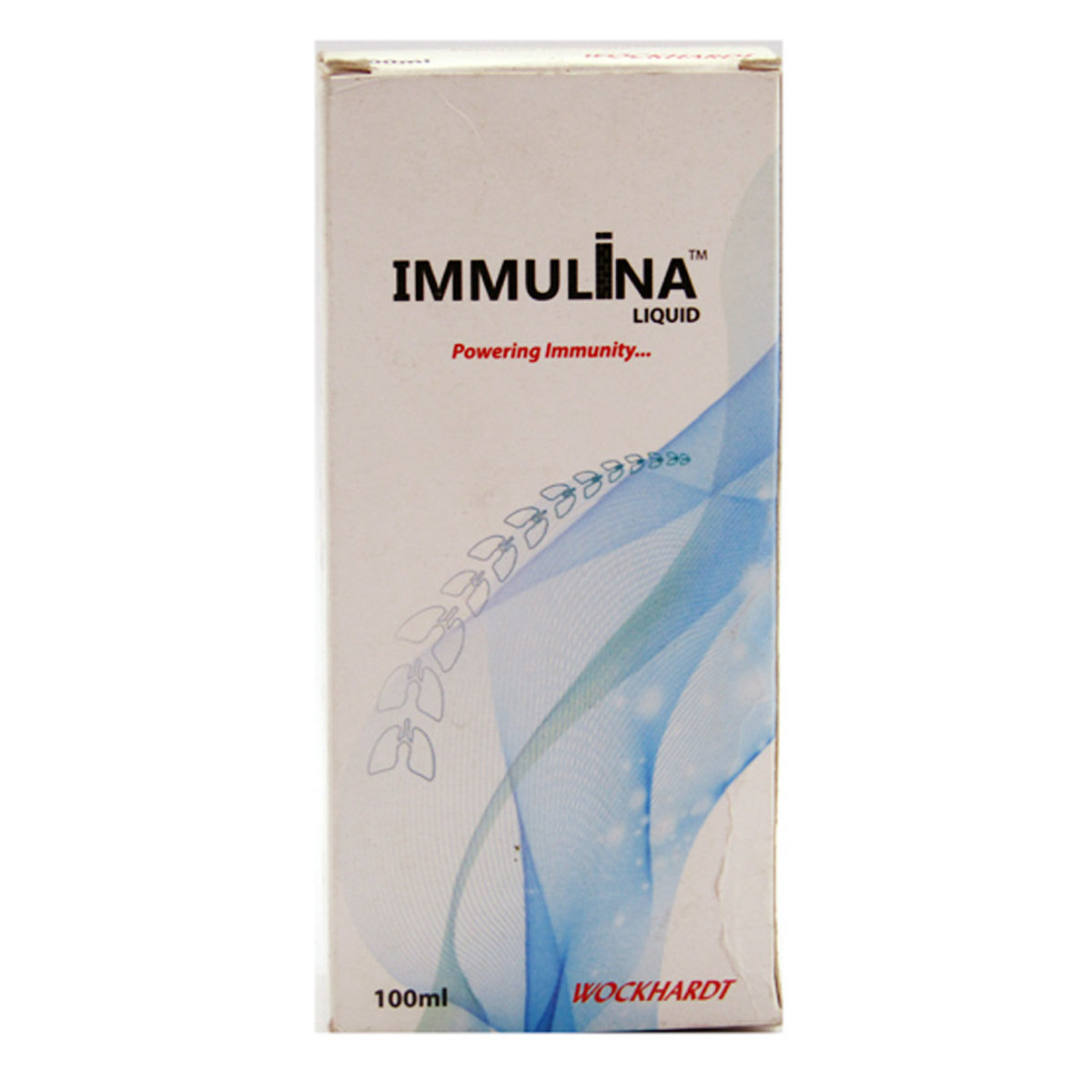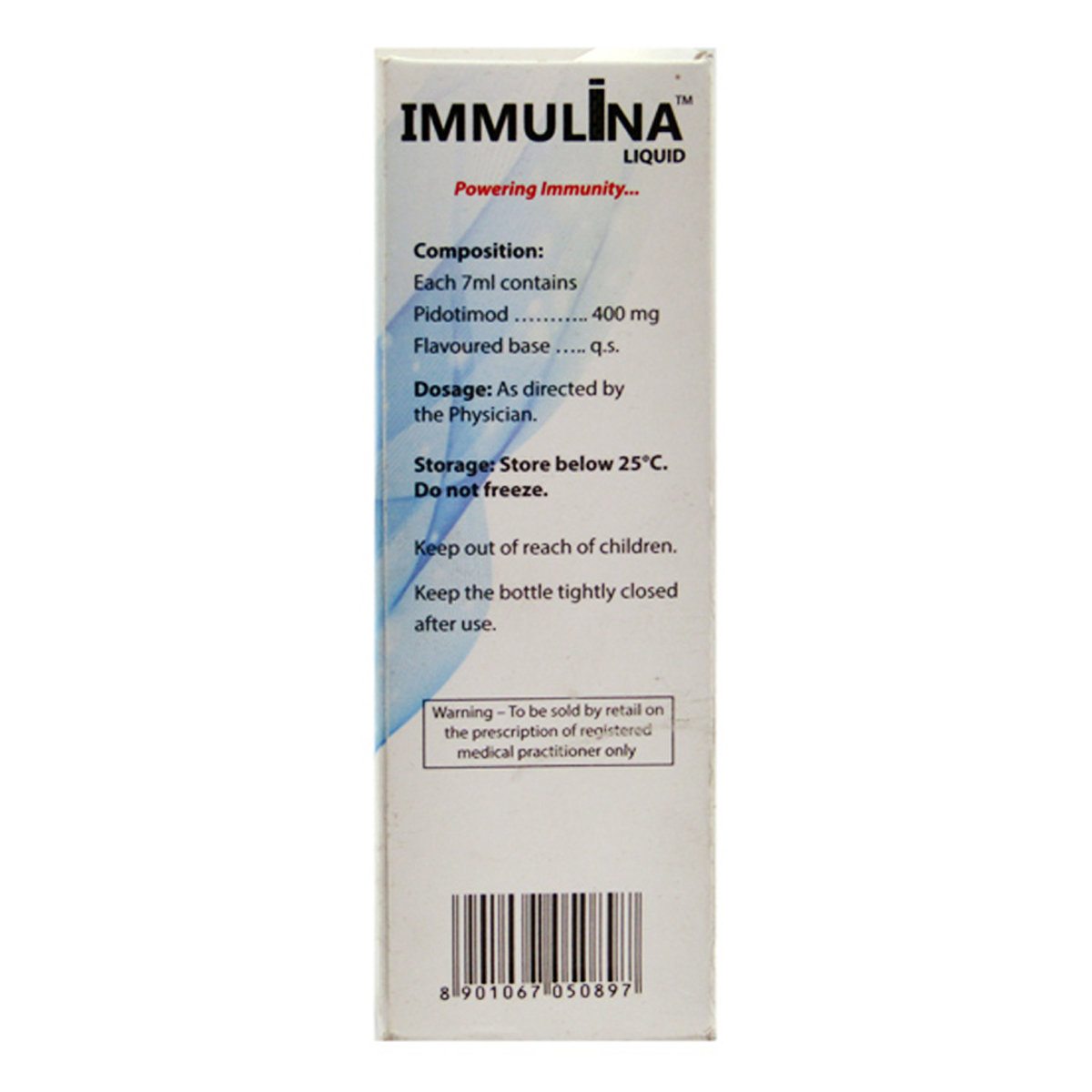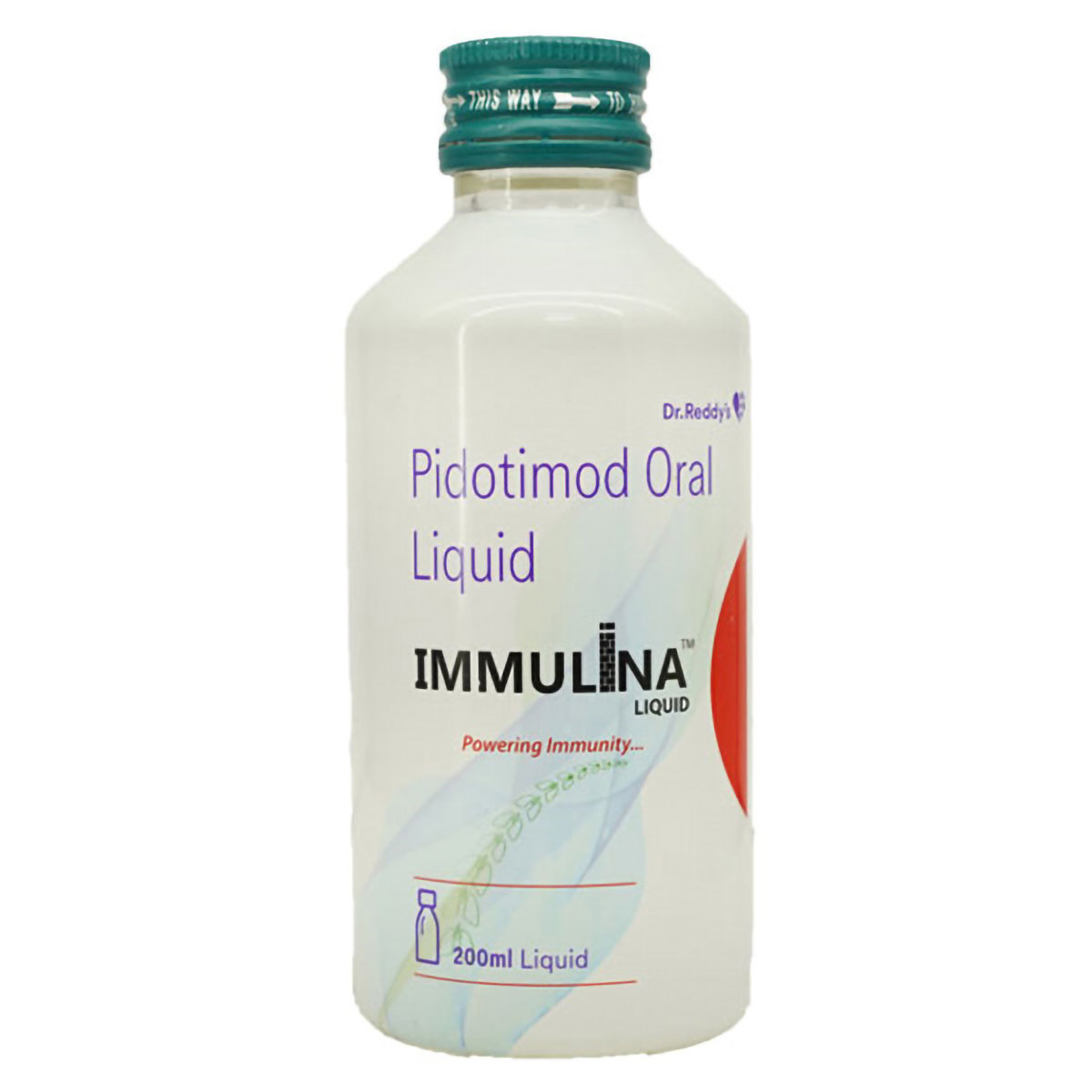Immulina Liquid 100 ml




MRP ₹425
(Inclusive of all Taxes)
₹63.8 Cashback (15%)
Selected Pack Size:100 ml
100 ml ₹382.5
(₹3.83 per ml)
In Stock
200 ml ₹892.4
(₹4.46 per ml)
In Stock
Provide Delivery Location
Online payment accepted
 Prescription drug
Prescription drugWhats That
Composition :
Manufacturer/Marketer :
Consume Type :
Expires on or after :
Return Policy :
About Immulina Liquid
Immulina Liquid belongs to the group of medications called ‘immunostimulants’ primarily used to treat respiratory system infections. Respiratory tract infection (RTI) is any infectious disease of the upper or lower respiratory tract. Upper respiratory tract infections (URTIs) include the Common cold, Sinusitis (sinus infection), Tonsillitis, and Laryngitis. Lower respiratory tract infections (LRTIs) include Bronchitis, Bronchiolitis, Chest infection and Pneumonia (lung infection). Flu can be an upper or lower RTI. Lower RTIs tend to last longer and can be more serious.
Immulina Liquid contains Pidotimod; as the active ingredient. It is an immunostimulant. It works by modulating the immune system to trigger a protective response against bacteria or viruses that cause recurrent airway infections. This boosts immunity against these infections.
Depending on your medical conditions, you are advised to take Immulina Liquid for as long as your doctor has prescribed it for you. Usually, no common side effects are seen with this medicine. But some people experience skin rash as a side effect. If these bother you or appear serious, let your doctor know. There may be ways of reducing or preventing them.
If you are known to be allergic to Immulina Liquid or any other medicines, please tell your doctor. Before taking this medicine, let your doctor know if you have kidney disease or have diabetes. Your doctor should also know about all other medications you are taking, as many of these may make this medicine less effective or change how it works. And also, inform your doctor if you are pregnant or breastfeeding.
Uses of Immulina Liquid
Directions for Use
Key Benefits
To obtain the best benefit, please follow your doctor's directions. Immulina Liquid contains Pidotimod; as the active ingredient. It is an immunostimulant. It works by modulating the immune system to trigger a protective response against bacteria or viruses that cause recurrent airway infections. This boosts immunity against these infections. Please do not stop taking it without consulting your doctor.
Storage
Drug Warnings
Inform your doctor if you are allergic to Immulina Liquid or other medicines. Before taking this medicine, let your doctor know if you have kidney disease or diabetes. Your doctor should also know about all other medications you are taking, as many of these may make this medicine less effective or change how it works. And also, inform your doctor if you are pregnant or breastfeeding. Immulina Liquid to be taken with caution, especially if you are children below 12. Your doctor may adjust your dose depending on your age. Consumption of alcohol with Immulina Liquid is not advisable as it may cause unpleasant side effects. Do not smoke – it can make your symptoms worse.
Drug-Drug Interactions
Drug-Drug Interactions
Login/Sign Up
Drug-Food Interactions
Drug-Food Interactions
Login/Sign Up
Diet & Lifestyle Advise
- Drink lots of water to loosen any mucus and make it easier to cough up
- Get plenty of rest
- Drink a hot lemon and honey drink to help soothe a cough (not suitable for babies under 1-year-old)
- Gargle with warm salt water if you have a sore throat (children should not try this)
- Raise your head while sleeping using extra pillows to make breathing easier and clear your chest of mucus
- Use painkillers to bring down a fever and help ease a sore throat, headaches and muscle pain.
- Cover your mouth when you cough or sneeze, and wash your hands regularly.
- Do not smoke – it can make your symptoms worse.
Side Effects of Immulina Liquid
- Urticaria/Rash
Habit Forming
Therapeutic Class
All Substitutes & Brand Comparisons
RX
Out of StockPolimod 400mg/7ml Liquid 100ml
Ajanta Pharma Ltd
₹325
(₹2.93/ 1ml)
23% CHEAPERRX
Immulina Liquid 200 ml
Wockhardt Ltd
₹991.5
(₹4.46/ 1ml)
16% COSTLIER
Product Substitutes
Author Details
We provide you with authentic, trustworthy and relevant information
Drug-Diseases Interactions
Drug-Diseases Interactions
Login/Sign Up
FAQs
Pidotimod is used to prevent diseases of the respiratory tract. Pidotimod is an immunostimulant. It works by modulating the immune system to trigger a protective response against bacteria or viruses that cause recurrent airway infections. This boosts immunity against these infections.
Immulina Liquid is a synthetic dipeptide that exerts immunostimulatory effects by affecting both innate and adaptive immunity.
No, it is a prescribed drug given by a physician to prevent specific medical conditions. Taking it on your own can cause unwanted side effects.
Your symptoms may improve before the problem is completely cured. But, completing the full course of treatment would be suggested even if you feel better.
Respiratory tract infection (RTI) is defined as any infectious disease of the upper or lower respiratory tract. Upper respiratory tract infections (URTIs) include the Common cold, Sinusitis (sinus infection), Tonsillitis, and Laryngitis. Lower respiratory tract infections (LRTIs) include Bronchitis, Bronchiolitis, Chest infection and Pneumonia (lung infection). Flu can be an upper or lower RTI. Lower RTIs tend to last longer and can be more serious.
Disease/Condition Glossary
Respiratory tract infection (RTI): Respiratory tract infection (RTI) is defined as any infectious disease of the upper or lower respiratory tract. Upper respiratory tract infections (URTIs) include the Common cold, Sinusitis (sinus infection), Tonsillitis, and Laryngitis. Lower respiratory tract infections (LRTIs) include Bronchitis, Bronchiolitis, Chest infection and Pneumonia (lung infection). Flu can be an upper or lower RTI. Lower RTIs tend to last longer and can be more serious.

Have a query?
Buy best Respiratory System products by
Cipla Ltd
Lupin Ltd
Glenmark Pharmaceuticals Ltd
Sun Pharmaceutical Industries Ltd
Alkem Laboratories Ltd
Macleods Pharmaceuticals Ltd
Mankind Pharma Pvt Ltd
Zydus Healthcare Ltd
Leeford Healthcare Ltd
Dr Reddy's Laboratories Ltd
Zydus Cadila
Abbott India Ltd
Intas Pharmaceuticals Ltd
Alembic Pharmaceuticals Ltd
German Remedies Ltd
Centaur Pharmaceuticals Pvt Ltd
Ipca Laboratories Ltd
Aristo Pharmaceuticals Pvt Ltd
Pristine Pearl Pharma Pvt Ltd
Wockhardt Ltd
GlaxoSmithKline Pharmaceuticals Ltd
Zuventus Healthcare Ltd
Koye Pharmaceuticals Pvt Ltd
Micro Labs Ltd
Blue Cross Laboratories Pvt Ltd
Medishri Healthcare Pvt Ltd
Med Manor Organics Pvt Ltd
Indiabulls Pharmaceuticals Pvt Ltd
Adonis Laboratories Pvt Ltd
FDC Ltd
Fourrts India Laboratories Pvt Ltd
Tablets India Ltd
J B Chemicals & Pharmaceuticals Ltd
Shreya Life Sciences Pvt Ltd
Divine Savior Pvt Ltd
Indoco Remedies Ltd
Seagull Pharmaceutical Pvt Ltd
Yash Pharma Laboratories Pvt Ltd
Torque Pharmaceuticals Pvt Ltd
Uniza Healthcare Llp
Wings Pharmacuticals Pvt Ltd
Biological E Ltd
Corona Remedies Pvt Ltd
Icarus Health Care Pvt Ltd
Steris Healthcare
Apex Laboratories Pvt Ltd
Geno Pharmaceuticals Pvt Ltd
Navil Laboratories Pvt Ltd
Precept Pharma
Aar Ess Remedies Pvt Ltd
La Renon Healthcare Pvt Ltd
Torrent Pharmaceuticals Ltd
Astra Zeneca Pharma India Ltd
Biochem Pharmaceutical Industries Ltd
Comed Chemicals Ltd
Entod Pharmaceuticals Ltd
Franco Indian Pharmaceuticals Pvt Ltd
Healthgate Pvt Ltd
Intra Life Pvt Ltd
Megma Healthcare Pvt Ltd
Pfizer Ltd
RPG Life Sciences Ltd
Unipark Biotech Pvt Ltd
Votary Laboratories (India) Ltd
Wanbury Ltd
Brinton Pharmaceuticals Ltd
Dolvis Bio Pharma Pvt Ltd
Eisen Pharmaceutical Co Pvt Ltd
Group Pharmaceuticals Ltd
Knoll Pharmaceuticals Ltd
Morepen Laboratories Ltd
Panacea Biotec Ltd
Prevego Healthcare & Research Pvt Ltd
Rnd Laboratories Pvt Ltd
Sanatra Healthcare Ltd
Skn Organics Pvt Ltd
Stedman Pharmaceuticals Pvt Ltd
Thuyam Life Pvt Ltd
Timon Pharmaceuticals Pvt Ltd
Aglowmed Pharmaceuticals Ltd
Ajanta Pharma Ltd
Alniche Life Sciences Pvt Ltd
Bio Warriors Pharmaceucticals Pvt Ltd
Biochemix Health Care Pvt Ltd
Cadila Healthcare Ltd
Cadila Pharmaceuticals Ltd
Caplet India Pvt Ltd
Chemo Healthcare Pvt Ltd
Delcure Life Sciences Ltd
East West Pharma India Pvt Ltd
Elder Pharmaceuticals Ltd
Embiotic Laboratories (P) Ltd
Emcee Pharmaceuticals (P) Ltd
Foregen Healthcare Ltd
Hetero Healthcare Pvt Ltd
Incite Pharmaceuticals
Iva Healthcare Pvt Ltd
Kepler Healthcare Pvt Ltd
Kristal Pharmaceuticals
Lincoln Pharmaceuticals Ltd
Alcohol
Safe if prescribed
Consume alcohol along with Immulina Liquid is not advisable as it may cause unpleasant side effects.
Pregnancy
Consult your doctor
Information regarding the use of Immulina Liquid during pregnancy is not available. Your doctor will weigh the benefits and potential risks before prescribing them. Please consult your doctor.
Breast Feeding
Consult your doctor
Consult your doctor; there is no substantial research yet on using Immulina Liquid in breastfeeding/nursing mothers. Your doctor will weigh the benefits and potential risks before prescribing them. Please consult your doctor.
Driving
Safe if prescribed
Not enough scientific data is available for Immulina Liquid . Hence it is advised to consult your doctor. Drive only if you are physically stable and mentally focussed. If you experience drowsiness after taking this medication, you should not drive or operate any machinery or vehicles.
Liver
Consult your doctor
There is limited information available on the use of Immulina Liquid in patients with liver disease. Your doctor will weigh the benefits and any potential risks before prescribing them to you. Please consult your doctor.
Kidney
Consult your doctor
Limited information is available on the use of Immulina Liquid in patients with Kidney disease. Your doctor will weigh the benefits and potential risks before prescribing them. Please consult your doctor.
Children
Safe if prescribed
Immulina Liquid to be taken with caution, especially if you are children below the age of 12. Your doctor may adjust your dose depending upon your age.







